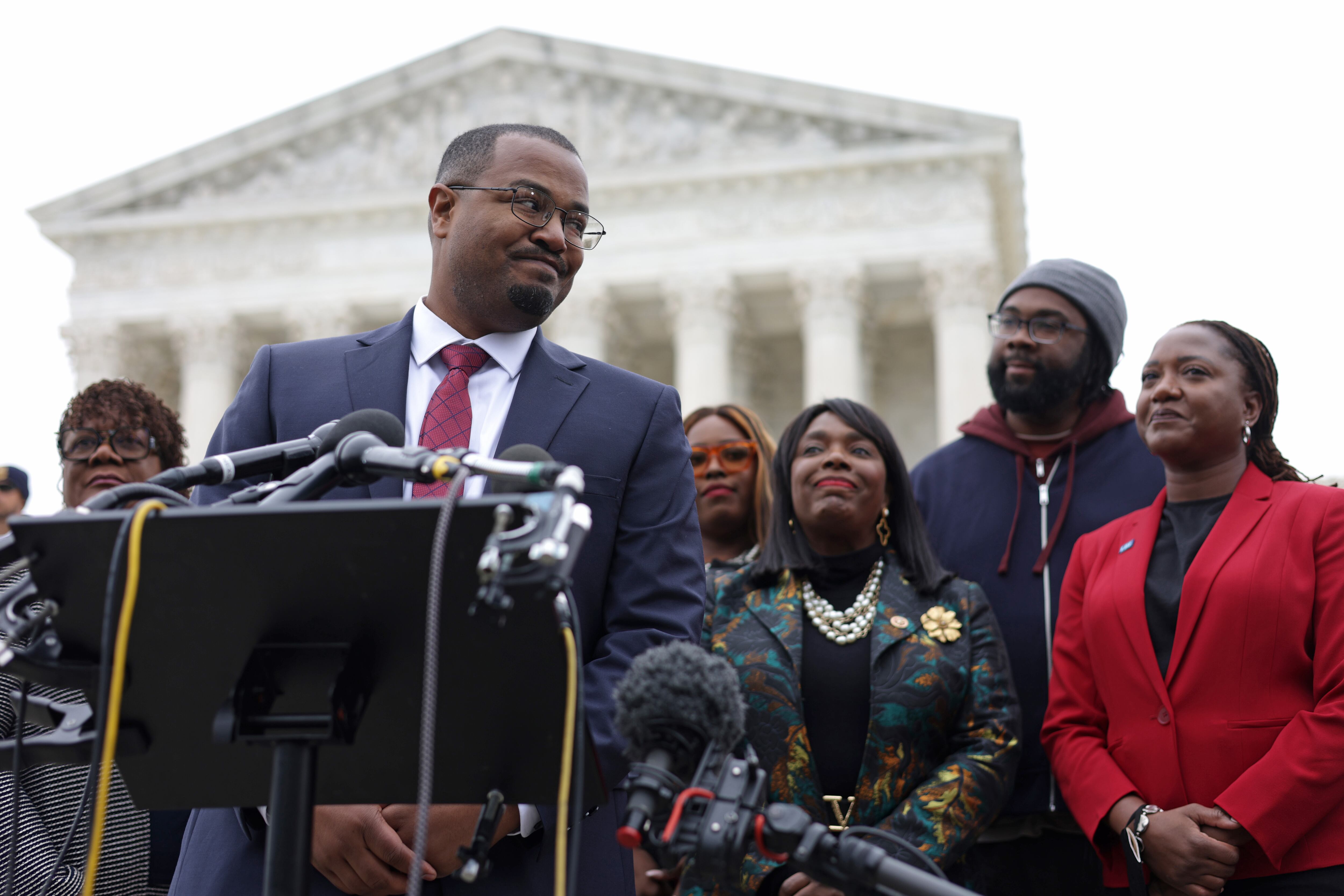A version of this post was originally distributed in Votebeat’s weekly newsletter. Sign up here.
Good morning,
Two debates — one behind closed doors and the other in the most watched courtroom in America — are highlighting a stark truth about a poorly understood process that’s also a cornerstone of our democracy.
In a conversation behind closed doors that was secretly recorded and publicly released, three members of the Los Angeles City Council participated in an unusually blunt conversation about redistricting, featuring startlingly racist language.
In the Supreme Court, oral arguments in an Alabama redistricting case, Merrill v. Milligan, provided clues last week as to whether the justices’ eventual decision will further weaken the landmark Voting Rights Act.
The redistricting process at the center of both conversations, of course, is the arcane process of redrawing political boundary lines every decade in response to population changes. To most people it seems like an esoteric exercise that doesn’t have much to do with their lives.
But redistricting, as these discussions made clear, is really about power — who has it and who doesn’t, who gains and who loses, whose voice is heard by politicians.
That brings us back to the racist comments in the recording of the three Los Angeles City Council members, all Democrats, in a conversation where one, Nury Martinez, referred to their colleagues (and, frankly, nearly everyone else) in revolting, racist language while discussing their goals for Latino districts.
The language this public official chose to use about their colleagues (and in a particularly repulsive instance, about a colleague’s young Black child) have rightly dominated the discussion about the audio, which has resulted in calls for the council members’ resignations.
By now, you’ve probably seen the most offensive comments from the audio recording. So for just a minute, let’s talk about the redistricting part. The council members were speaking, in unusually blunt terms, about how to maximize Latino clout and representation at the expense of Black voters and other diverse constituencies — who they saw as allies or adversaries, what they stood to gain from the maps.
Los Angeles is a diverse city with many communities of color — a growing Asian population, a Black population that has long wielded political clout, and Latinos making up the largest ethnic group.
What the secretly recorded conversation exposed is that the council members involved seemed to view redistricting as a zero-sum game, with communities gaining or losing power in the city at each other’s expense.
Martinez, the Los Angeles City Council president, wanted to keep economic assets like the Van Nuys airport in her district. “If you’re going to talk about Latino districts, what kind of districts are you trying to create?” she asked. “Because you’re taking away our assets. You’re just going to create poor Latino districts with nothing?” Martinez resigned Wednesday.
And at some base level, power and assets are what everyone was fighting about before the Supreme Court, too. Alabama’s voting-age population is about 27 percent Black, but only one of its seven congressional districts is majority Black. Black voters and advocacy groups challenged the state’s political map under the Voting Rights Act, saying it illegally diluted the Black vote. A panel of federal judges ordered Alabama to create a second district with a majority of Black voters, or close to it.
Alabama, for its part, appealed, essentially arguing that it had used race-neutral criteria to create its map and the Voting Rights Act was only meant to apply in cases of intentional discrimination — a pretty radical reading of the law that would further limit the application of the landmark civil rights statute, and one that not even the most conservative justices on the court seemed ready to embrace.
No less than Supreme Court Chief Justice John Roberts has said the lower court correctly applied existing law in ordering the creation of the second majority Black district. Nonetheless, many observers think Alabama is likely to win at least a narrow victory before this Supreme Court, which has, in recent years, issued decisions making it harder for plaintiffs to successfully bring cases under the Voting Rights Act.
The oral arguments often featured the kind of language that makes legal arguments — and redistricting — harder to understand. Redistricting typically takes into account commonly used criteria, such as “communities of interest” and “compactness,” that aren’t always clear to the general public.
Sometimes, the definition of such terms is in the eye of the beholder, and it isn’t always clear how the different criteria are balanced. For example, Justice Sonia Sotomayor pointed out the state has been unwilling to split Mobile and Baldwin counties, arguing they’re a community of interest because many of the white residents share French and Spanish ancestry, but has split the Black Belt. During the back-and-forth, Alabama’s solicitor general, Edmund LaCour Jr., arguing for the state, said, “I don’t think courts are very well-positioned to judge how — which community of interest should be weighed in which way.”
And Justice Brett Kavanaugh admitted during an exchange over whether a proposed district was “reasonably compact” that he, too, was grappling with how to apply the concepts in practice.
“And I will be candid, for both sides, I don’t really know how to measure reasonably compact,” Kavanaugh acknowledged. “There’s been a lot written about it and I’ve read a lot. It’s very hard to measure.”
If Kavanaugh, who no doubt has the assistance of his able law clerks and rapid access to all relevant context, isn’t sure whether something meets the definition, it’s no wonder the public struggles. Most people have far less ability to parse this process, which ultimately decides how well represented they are at every political level.
But the recorded conversation between the Los Angeles City Council members made it clear that politicians know the deal.
Back Then
This isn’t the first time an Alabama redistricting case has required the Supreme Court to consider whether proof of discriminatory intent was required in order to overturn a political map. In 1980’s City of Mobile v. Bolden, the Supreme Court ruled that constitutional remedies were only available if the decisions were motivated by a discriminatory purpose. In response, in 1982, Congress amended the Voting Rights Act to make it clear discriminatory intent wasn’t required to establish a violation of Section 2.
New From Votebeat
Cochise County officials are considering hand-counting all ballots cast by the county’s 87,000 voters this election, a radical measure for a county of its size that election experts say is also problematic and unnecessary, Jen Fifield reports for Votebeat Arizona. In a second story, Fifield reports the county’s own lawyer believes the plan to hand count ballots is illegal, and the county attorney may be able to prevent county supervisors from moving forward with the proposal.
A Texas judge ruled against plaintiffs in a lawsuit claiming election malfeasance in connection with the defeat of a 2019 proposal to remove fluoride from Fredericksburg’s water system, Natalia Contreras reports for Votebeat Texas. It is the latest in a string of court losses for Pressley, a long-time Central Texas anti-fluoride activist, conspiracy theorist, perennial candidate for office, and self-styled trainer for poll watchers who even has her own state political action committee. This year alone, the Texas Supreme Court has dismissed at least two lawsuits she filed against the secretary of state, in which she claims the office isn’t following election law. This pattern, election experts and advocates say, promotes misinformation, wastes resources, and could further harm the election process.
In Other Voting News
- Republicans are complaining, and in some cases suing, over the party affiliations of poll workers, claiming local election officials are not taking steps to include enough GOP workers, the Washington Post reports. Local election officials, for their part, say they are following requirements that mandate a mix of partisan affiliations among poll workers, but they can’t guarantee, and aren’t required to have, equal numbers from each party in every county.
- Social media accounts spreading misinformation are doing so in more languages and across a wider array of platforms, and social media companies are doing little to stop the spread of it, according to the New York Times.
- In Florida, Gov. Ron DeSantis issued an executive order granting three counties affected by Hurricane Ian new flexibility in conducting elections. Among other things, the order allows Lee, Charlotte, and Sarasota counties to consolidate polling places, although it makes clear that any new locations would ideally be in the same precinct or close to it, the Miami Herald reports.
- An election integrity effort in North Carolina is putting new burdens on local election officials and is closely linked to national efforts, according to this deep dive from The Assembly.
- Florida Gov. Ron DeSantis, a Republican, worked behind the scenes with one of the GOP’s top redistricting lawyers and other partisan players to draw his redistricting map, a process that potentially violated state law, according to ProPublica.
- The Colorado secretary of state’s office says a database glitch caused it to mistakenly mail roughly 30,000 noncitizens instructions on how to register to vote, according to the Associated Press. The office said it would ensure none of the noncitizens actually registered due to the error.
- Pinal County, Arizona is paying its elections director $200,000 for four months of work if the county’s November election is successful after a troubled primary, the Arizona Republic reports. Elections Director Virginia Ross, previously the county’s recorder, agreed to step in to replace the elections director who was fired after the primary. (Read Votebeat’s coverage of the problems in Pinal County here.)
Carrie Levine is Votebeat’s story editor and is based in Washington, D.C. Contact Carrie at clevine@votebeat.org.






